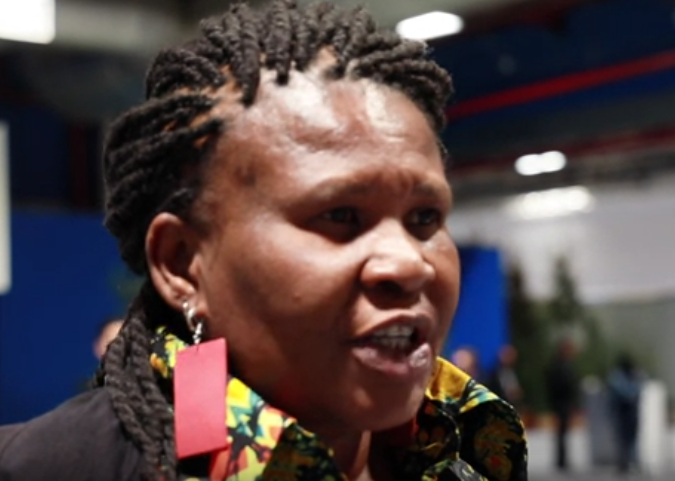In this interview during COP25, Makoma Lekalakala (Goldman Environmental Prize 2018) and member of Earthlife Africa, Johannesburg, talks to Pressenza about the role of women in the climate change debate, the nonsense of using nuclear energy in Africa and what civil society expects of northern hemisphere multinational companies who are profiting from the business of pollution and climate change.
We thank Teresa Vicente Giménez for her collaboration in this interview.
Transcription
On the role of women in defending the environment
I think as women, we are the ones that take care of nature. I think in this conference also you can see that, particularly from civil society organizations, there’s more women than men, because we are the ones that are protecting Mother Nature. Nature is us. And we know that, if we don’t mitigate against climate change that would be a human right violation and also that we would be struggling to survive. This is about our survival. That is why women are here, that is why we are here, and this is why we are naming and shaming those who are responsible for the climate destruction that we find ourselves in. And as women, I think we will continue be the protectors of Mother Nature and ensure that there is no climate destruction at all.
Tell us about the nuclearization of Africa
Firstly we didn’t need any nuclear power in Africa at all. We have got one nuclear power station in South Africa, in Cape Town. That was built during the Apartheid era and during the Apartheid era the majority of people never had rights nor would comment or say what they wanted or what they didn’t want, because we lived in a repressive state. But since knowing that nuclear energy is linked to war, nuclear energy is linked to repression and everything about nuclear is done secretly. We cannot listen to the nonsense that nuclear is the solution to climate change. The nuclear fuel chain has got to be taken care of. There is uranium mining, and the uranium mining has a devastating impact on the people living in Africa, because in other countries there’s not even regulation around mining. So mining is done dangerously and the whole place is left radioactive. For an example, I live in Johannesburg and Johannesburg is one of the most radioactive cities in the world because of the legacy of gold mining in South Africa.
You defend ecological justice. What measures do you propose?
I think one is, it has always been the northern-originating multinational corporations and transnational corporations that have caused chaos in Africa and the most of them don’t even respect the laws of different countries. They do whatever they can. So it’s business as usual for them. And they have a privilege and that privilege, I think, has got to be used to ensure that Africa doesn’t burn because we are at a rate where we are going to burn because of the heat that is amongst us, the climate-induced natural disaster that we continuously are facing. This is all because of what northern companies have been involved in. So loss and damage, it’s just one of the issues that haven’t been discussed yet and we expect governments, particularly northern governments, to do the right thing. We will be looking at them, our eyes are on them, and we expect them to do the right thing and ensure that whatever we’re experiencing, we don’t experience it anymore. And they must come up with or accelerate a Convention as soon as we can. Maybe we should have had a Convention 20, 30 years ago, but then, but those who have interest in profiting from pollution are part of this negotiation. So it’s not happening. If the companies can be kicked out that is then that we would say that the polluting companies can be kicked out of the negotiation, that’s the number one thing. That’s what we expect. The second one it’s an acceleration of coming up with the climate change convention and also that would include Human Rights at the centre. And the third thing that I think needs to happen is for the northern countries to acknowledge the South – the damage in the south, the climate change-induced natural disasters, which are of their making, and they have to ensure that there is financing, and that they contribute to that, and not just make pledges but make actual contributions. And I think that then would we be saying that the North is doing its best and by contributing to the climate finance that would mean that southern countries would be able to adapt and also use the finance that is available to them to develop much more alternative energy or electricity, technologies that would be of benefit to all of us.
A final message to the population
The people have had experiences, businesses and government. So what is important it is for the government and business to listen to what people are saying, but for now it’s important for each and every one of us to stand up, because this is about our survival. If we are hit by the negative impact of climate change, like we are told, we have 11, 10 years available. That means all of us are going to perish, and so it’s important for us to stand up, to rise, and to demand climate justice. And it is not just demanding climate justice, it’s about preserving our rights and the rights of Mother Nature and ensuring that we all survive.










